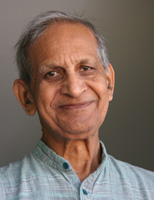Search for:
ASIAN
CANADIANS
> Science
& Technology >
Dr. Gulshan Rai Saini (1924-2007)
 Dr. Gulshan
Rai Saini (1924-2007) was a soil scientist who worked for decades
among the potato farmers of the Saint John River Valley, and
was one of the earliest members of the mid-twentieth century
wave of Indian immigrants to North America.
Dr. Gulshan
Rai Saini (1924-2007) was a soil scientist who worked for decades
among the potato farmers of the Saint John River Valley, and
was one of the earliest members of the mid-twentieth century
wave of Indian immigrants to North America.
Dr. Saini was born in Punjab
in 1924 and grew up in Nankana Sahib, which is now a part of
Pakistan. He went on to study agricultural science, earning a
Bachelors of Science and a Masters of Science from Punjab University.
He was then accepted into a doctoral program at Ohio State University,
arriving in the United States in 1957. After earning his doctorate
in 1960, he returned to work as an assistant professor at Punjab
Agricultural University in Ludhiana, India.
Dr. Saini eventually became
disillusioned with the political climate in Punjab and immigrated
to Fredericton, New Brunswick, in October 1961. He researched
soil and water issues for the Canadian Department of Agriculture
for 23 years.
Not only was Dr. Saini concerned
with his field of expertise, he was also concerned with broader
social issues. He was a founder of the Multicultural Association
of Fredericton, served on a national advisory board on multiculturalism
for the Canadian government and was vice-president of the Professional
Institute of Canada.
In the mid-1980s, Dr. Saini
retired and moved to Brookline, Massachusetts, to be closer to
his son. While there, he served on the Board of the Coalition
for a Strong United Nations, was treasurer of the Third World
Scholars Consortium, and was a longtime member of Friends of
the Muddy River and Restore the Olmsted Waterway. He also served
on a state advisory board on water management issues. He was
founder of the Saini Foundation, and at the time of his death,
he was developing a college scholarship program for girls from
his ancestral village, Bohon, Punjab.
Dr. Saini left behind his wife,
Dr. Veena Saini; a son, Vikas Saini, M.D.; and two granddaughters,
Naima and Sahima.
<<
top
 The project was made
possible with the support of the
The project was made
possible with the support of the
Department
of Canadian Heritage through the Canadian Culture Online Strategy
The Acrobat Reader
is available free from 